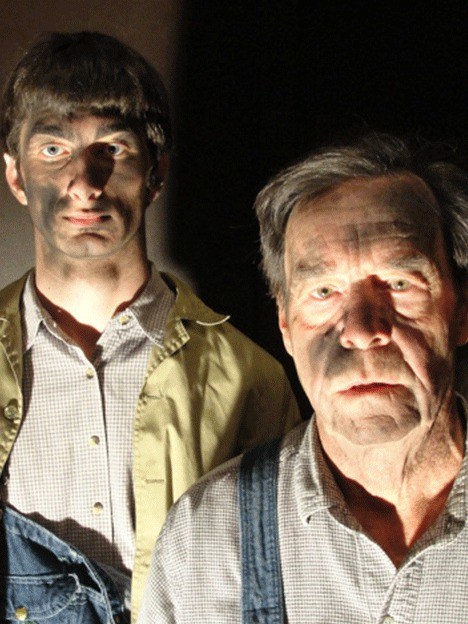This month in Langley you might feel the urge to hear some fine Appalachian bluegrass music, or attend a downhome, foot-stompin play party, or find out if you have any ancestors that came out of Kentucky or maybe even have a rollin’- in-the-mud good fight with one of your cousins over who owns the land.
Blame it on the Kentucky Project.
Whidbey Island Center for the Arts presents an all-encompassing cultural event with the Kentucky Project, a series of events which kicks off with “Simple Gifts: The Music of America,” a WICA Conservatory Choir concert on March 14; entertains the family with “Play Party: Songs and Stories of Appalachia,” on March 19; and builds to a crescendo with the Pulitzer Prize-winning play “The Kentucky Cycle,” opening April 9.
The project also features partnerships with community events such as the WICA lobby exhibit of the Genealogical Society of South Whidbey Island’s “Ties that Bind: The Biggs, Rowen, and Talbert Families.” This visual exploration of the ancestry and relationship of the fictional families of “The Kentucky Cycle,” hones in on the real events that shaped the lives of the people of Appalachia.
Another community-partner event is “Our Lives, Our Land: The Kentucky Cycle Stories in the Good Cheer Garden,” at 2 p.m. Saturday, April 17. This event includes prologues (30-minute educational programs with audience participation), a community discussion led by AmeriCorps volunteers, a sampling of food from Good Cheer’s garden, and a performance by the WICA Chamber Singers, an advanced group of local vocalists.
The arts center has stepped out of its singular theater season role and extended the reach of its next theatrical production to include history, genealogy, food, music and stories along with all the drama. It welcomes the community to explore the conversation that a play such as “The Kentucky Cycle” can spark.
Here’s an overview of all three productions.
First: The play.
Talk about a rough ride. The House of Atreus has nothing on the Rowen family.
You remember the Oresteia.
It was that Greek story about the King of Argos, Agamemnon, who trudges home from the Trojan War only to find his scheming and adulterous wife, Clytemnestra, waiting for him so that she can murder him. Well, you can’t really blame her. This is Clytemnestra’s revenge for when Agamemnon sacrificed their daughter Iphigenia, and then left for 10 years. You know, typical family stuff.
Playwright Robert Schenkkan reveals the same sort of myth-like familial tragedy with his Pulitzer Prize-winning play “The Kentucky Cycle.” But instead of some ethereal Greek landscape, it all happens on the dark, unforgiving soil of the American West.
The sweeping epic of three families in eastern Kentucky spans 200 years of American history, from 1775 to 1975, and focuses on the long feud between landowners along the Cumberland Plateau after a single act of violence sets off tragic repercussions for each generation to follow.
“The Kentucky Cycle” examines the myths of the American past which have created, for better or for worse, the country we are today. It explores violence as an ubiquitous part of American life — whether that violence is racial, gender-based or environmental — and how each generation deals with the American tendency to use force first and face the consequences later.
In this fast-paced ensemble- and story-driven stunner, director Michael Barker re-creates the American mythological masterpiece that encompasses six hours in a nine-play cycle, with 33 actors portraying 70 characters in two individual productions.
The play premiered at the Intiman Theatre in Seattle in 1991. It was awarded the Pulitzer in 1992 and went on to win both the PEN Centre West and the Los Angeles Drama Critics Circle Awards for best play.
Part one opens Friday, April 9 through Sunday, April 11. It continues the following weekend with part two opening Friday, April 16-18. In its final week, part one plays on Friday, April 23 and part two on Saturday, April 24. (See schedule on previous page for more details.)
The creative team is Barker (director), Jim Scullin (assistant director), Susan Melman (dramaturg), Barker and Scullin (scenic design), Valerie Johnson (costume design), Ann Deacon (lighting design), Caitlin Goldbaum (music consultant/education assistant), Mikkel Hustad (choral director) and Mike McVay (fight director).
The cast includes Bob Atkinson, Ethan Berkley, Bristol Bloom, Laura Boram, Matt Bursell, Tony Caldwell, Carrie Carpenter, Tom Churchill, Barton Cole, Adrian Cook, Jameson Cook, Damien Cortez, T. Addelle Dierking, Gail Fleming, Hairstun Dwayne Hamby, Sommer Harris , Eric Hood, Mikkel Hustad, Kent Junge, Paul Mathews, Pat McVay, Shellie Moore, Laura Persaud, Daniela Rose, Ryan Ramie Rose, Zachary Schneider, Rob Scott, Jim Scullin, Eric Vanderbilt-Mathews, Erick Westphal, Larry Woolworth, Dwight Zehm, Jenny Zisette.
The musicians are Ron Swenson (guitar, banjo), Eric Vanderbilt-Mathews (concertina) and Mira Yamamoto (violin).
Kate Scott is the assistant production stage manager, T. Addelle Dierking is the rehearsal stage manager, Jamesan Gavac is the technical intern and Caitlin Goldbaum is an AmeriCorps intern.
Check the WICA Web site, click here, for schedule information and ticket prices.



